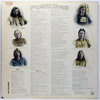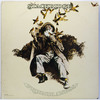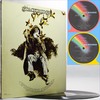Year: 1972 (LP 1973)
Label: MCA Records (USA), MCA-308
Style: Classic Rock
Country: Bristol, England
Time: 41:35
Format: Flac Tracks 16/44,1
Size: 251 Mb
Stackridge were a British rock group which had their greatest success in the early 1970s.
Stackridge Lemon were formed from the remains of Grytpype Thynne by Andy Davis and James "Crun" Walter during 1969 in the Bristol/Bath area of the United Kingdom. After initial experimentation, the word Lemon was dropped from the band's name. The band played their first London gig at The Temple in Wardour Street on 6 February 1970. They were the opening and closing act at the first Glastonbury Festival between 19 September and 20 September 1970. During 1970 the members of the band shared a communal flat as their headquarters at 32, West Mall in Clifton, Bristol, the address of which Davis and Warren later used as the title of a song which appeared on the debut album Stackridge.
During 1971 Stackridge began serious gigging, although Crun left to take up bricklaying. Davis, Warren, Bent, Evans, and Slater embarked on a UK tour supporting Wishbone Ash. Later in the year they signed to MCA Records and recorded their first album Stackridge, at De Lane Lea Studios, London. They toured the UK as headliners with Renaissance supporting and played their first John Peel session for the BBC, which included a version of The Beatles' Norwegian Wood (This Bird Has Flown).
The group continued on a year of touring, again with Wishbone Ash and Forever More. The second album Friendliness was quickly recorded in August 1972 and released in November with some songs that had started life in pre-Stackridge days. By this time Crun had rejoined the band which consisted of Davis, Warren, Slater, Evans, Walter and Billy Sparkle.
In February 1973 the band made their first television appearance on BBC2's "The Old Grey Whistle Test". They then toured during February and March with Camel in support. The third album The Man in the Bowler Hat was recorded during 1973 at AIR Studios, London with producer George Martin. The album was released in February 1974 to excellent reviews, but failed to sell in large quantities. This was the highest-charting Stackridge album in the UK, reaching no. 23. A different version of the album was released in the U.S. under the title Pinafore Days and became ther only U.S. chart entry, peaking at no. 191, although a US tour never materialised. Almost as soon as the album was finished the band were joined by Keith Gemmell from Audience; and shortly thereafter Evans, Slater, Sparkle, Walter, and Warren all departed the band and were replaced by Rod Bowkett (keyboards), Rare Bird member Paul Karas (bass), and Roy Morgan (drums), as Davis took full control of the band. The group that went on tour to support the album sounded quite different from the one on the record.
The fourth album Extravaganza on Elton John's record label The Rocket Record Company was recorded at AIR Studios with Tony Ashton producing and Rod Bowkett joining to contribute to the songwriting. The band now consisted of Davis, Bowkett, Gemmell, Karas and Morgan, along with the returning Slater, Evans, and Walter. Non-Stackridge written songs and cover versions became more prevalent. With more touring and an appearance at Wembley Stadium concert with Elton John and The Beach Boys, 1975 saw the recording of the band's fifth outing in the studio, the concept album Mr. Mick. It was based on stories/poems by Steve Augard and was eventually recorded at Ramport Studios, Putney with the revised line-up of Davis, Slater, Walter, Gemmell plus the addition of ex-Greenslade Dave Lawson on keyboards and Peter Van Hooke on drums.
The Rocket Record Company, the group's record label, performed considerable editing on Mr. Mick, and insisted on the inclusion of a Beatles cover song, "Hold Me Tight". The album received some good press, but some shows were abandoned on the grounds that the stages were too small. Stackridge performed a final show in April 1976, and shortly afterwards the band disintegrated. MCA Records released the compilation Do the Stanley late in 1976. It contained songs from the first three albums along with singles and a previously unreleased song "Let There Be Lids", taken from live performances.
Stackridge officially announced in 1977 that they had disbanded; James Warren and Andy Cresswell-Davis formed The Korgis a few years later, and had some commercial success in the early 1980s.
(Wikipedia)
01. A1 Lummy Days (03:22)
02. A2 Friendliness (Part 1) (02:28)
03. A3 Anyone For Tennis (02:32)
04. A4 There Is No Refuge (03:23)
05. A5 Syracuse The Elephant (08:46)
06. B1 Amazingly Agnes (03:31)
07. B2 Father Frankenstein Is Behind Your Pillow (03:36)
08. B3 Keep On Clucking (04:04)
09. B4 Story Of My Heart (02:01)
10. B5 Friendliness (Part 2) (01:56)
11. B6 Teatime (05:50)





TurboBit
KatFile
UsersDrive
EasyFileCloud
Label: MCA Records (USA), MCA-308
Style: Classic Rock
Country: Bristol, England
Time: 41:35
Format: Flac Tracks 16/44,1
Size: 251 Mb
Stackridge were a British rock group which had their greatest success in the early 1970s.
Stackridge Lemon were formed from the remains of Grytpype Thynne by Andy Davis and James "Crun" Walter during 1969 in the Bristol/Bath area of the United Kingdom. After initial experimentation, the word Lemon was dropped from the band's name. The band played their first London gig at The Temple in Wardour Street on 6 February 1970. They were the opening and closing act at the first Glastonbury Festival between 19 September and 20 September 1970. During 1970 the members of the band shared a communal flat as their headquarters at 32, West Mall in Clifton, Bristol, the address of which Davis and Warren later used as the title of a song which appeared on the debut album Stackridge.
During 1971 Stackridge began serious gigging, although Crun left to take up bricklaying. Davis, Warren, Bent, Evans, and Slater embarked on a UK tour supporting Wishbone Ash. Later in the year they signed to MCA Records and recorded their first album Stackridge, at De Lane Lea Studios, London. They toured the UK as headliners with Renaissance supporting and played their first John Peel session for the BBC, which included a version of The Beatles' Norwegian Wood (This Bird Has Flown).
The group continued on a year of touring, again with Wishbone Ash and Forever More. The second album Friendliness was quickly recorded in August 1972 and released in November with some songs that had started life in pre-Stackridge days. By this time Crun had rejoined the band which consisted of Davis, Warren, Slater, Evans, Walter and Billy Sparkle.
In February 1973 the band made their first television appearance on BBC2's "The Old Grey Whistle Test". They then toured during February and March with Camel in support. The third album The Man in the Bowler Hat was recorded during 1973 at AIR Studios, London with producer George Martin. The album was released in February 1974 to excellent reviews, but failed to sell in large quantities. This was the highest-charting Stackridge album in the UK, reaching no. 23. A different version of the album was released in the U.S. under the title Pinafore Days and became ther only U.S. chart entry, peaking at no. 191, although a US tour never materialised. Almost as soon as the album was finished the band were joined by Keith Gemmell from Audience; and shortly thereafter Evans, Slater, Sparkle, Walter, and Warren all departed the band and were replaced by Rod Bowkett (keyboards), Rare Bird member Paul Karas (bass), and Roy Morgan (drums), as Davis took full control of the band. The group that went on tour to support the album sounded quite different from the one on the record.
The fourth album Extravaganza on Elton John's record label The Rocket Record Company was recorded at AIR Studios with Tony Ashton producing and Rod Bowkett joining to contribute to the songwriting. The band now consisted of Davis, Bowkett, Gemmell, Karas and Morgan, along with the returning Slater, Evans, and Walter. Non-Stackridge written songs and cover versions became more prevalent. With more touring and an appearance at Wembley Stadium concert with Elton John and The Beach Boys, 1975 saw the recording of the band's fifth outing in the studio, the concept album Mr. Mick. It was based on stories/poems by Steve Augard and was eventually recorded at Ramport Studios, Putney with the revised line-up of Davis, Slater, Walter, Gemmell plus the addition of ex-Greenslade Dave Lawson on keyboards and Peter Van Hooke on drums.
The Rocket Record Company, the group's record label, performed considerable editing on Mr. Mick, and insisted on the inclusion of a Beatles cover song, "Hold Me Tight". The album received some good press, but some shows were abandoned on the grounds that the stages were too small. Stackridge performed a final show in April 1976, and shortly afterwards the band disintegrated. MCA Records released the compilation Do the Stanley late in 1976. It contained songs from the first three albums along with singles and a previously unreleased song "Let There Be Lids", taken from live performances.
Stackridge officially announced in 1977 that they had disbanded; James Warren and Andy Cresswell-Davis formed The Korgis a few years later, and had some commercial success in the early 1980s.
(Wikipedia)
01. A1 Lummy Days (03:22)
02. A2 Friendliness (Part 1) (02:28)
03. A3 Anyone For Tennis (02:32)
04. A4 There Is No Refuge (03:23)
05. A5 Syracuse The Elephant (08:46)
06. B1 Amazingly Agnes (03:31)
07. B2 Father Frankenstein Is Behind Your Pillow (03:36)
08. B3 Keep On Clucking (04:04)
09. B4 Story Of My Heart (02:01)
10. B5 Friendliness (Part 2) (01:56)
11. B6 Teatime (05:50)





TurboBit
KatFile
UsersDrive
EasyFileCloud

No comments:
Post a Comment